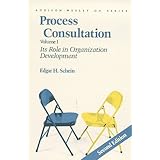
Average Reviews:

(More customer reviews)In this second volume, Schein builds on Volume I by dissecting the nature of process and change in lieu of the specific group processes that make or break effective group work. Likewise, in this volume, he brings the concept of process consultation home, so to speak, to help managers and leaders understand themselves and their organizations as a consultant might understand them.
Given that process consultation assumes that organizational leaders know their organizations best and are the most appropriate and capable managers of change, it makes sense that organizational leaders understand group processes. Schein emphasizes that diagnosing an organization's problems is intervening to fix them. He provides explanations of the circumstances when process consultation is most necessary. He advises leaders that more time must be spent intervening on how things get done than on what actually needs to get done. "An effective manager must be able to create situations that will ensure that good decisions are made, without making those decisions himself and without even knowing ahead of time what he might do if he had to make the decision alone." (p.39)
Schein provides a useful model for differentiating between the content, process, and structure of organizational challenges and the task and interpersonal aspects of those challenges. He advises that process should always be favored over content; that task aspects should always be favored over the interpersonal; and that structure, while potentially the most transformative element of change, is the most difficult area to address, because people will resist tampering with the comfort structure provides. He also provides explanations on the essential challenges relevant to content and process that every group must face. The lesson he offers for leaders and consultants is that whatever is done to solve a problem must begin with a clarification of the primary task of the group.
Schein devotes considerable space to explaining the ORJI model of intrapsychic processes. (We observe, we react - emotionally, we judge based on our observations and feelings, and we intervene to make something happen.) "The most important thing for managers or consultants to understand is what goes on inside their own heads." (p.63) The trap of ORJI is MIRI, i.e., that we misperceive, inappropriately react, react rationally based on bad data, and intervene incorrectly. To avoid the MIRI trap, we must check our cultural assumptions, our personal filters (see volume I), and our situational expectations based on previous experiences. Schein also provides a clear synthesis of the unfreezing, changing, refreezing model of change and improvement. In unfreezing, the motivation and readiness for change are developed; in changing, new points of view are adopted; and in refreezing, new points of view are integrated to affect changes in the process approaches to tasks.
Schein devotes most of the latter half of his book to explanations and analyses of intervention processes. He discusses the "exploratory", "diagnostic", "action alternative", and "confrontive" models of intervening, how they might initiated and when one might use each. "...The tactics of intervention should focus initially on exploration, inquiry, and diagnosis. Only when the consultant feels that the client is ready to think about alternative next steps is it appropriate to move to action alternatives and confrontive interventions." (p.157) Schein also provides specific kinds of interventions which might fall into any one of these four basic categories of intervention.
This volume, taken with the first, provide not only a clear theoretical framework for understanding organizational change, but also useful tools and approaches for pre-empting organizational roadblocks and addressing organizational dilemmas once they've appeared. These books are essential reading for any leader or consultant.
Click Here to see more reviews about: Process Consultation: Its Role in Organization Development, Volume 1 (Prentice Hall Organizational Development Series) (2nd Edition)
A member of the PH OD Series! How can you influence a situation in the workplace without the direct use of power of formal authority? This book shows you how by presenting the core theoretical foundations and basic prescriptions for effective management.
